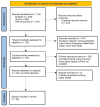Use of Artificial Intelligence in Triage in Hospital Emergency Departments: A Scoping Review
- PMID: 38854295
- PMCID: PMC11158416
- DOI: 10.7759/cureus.59906
Use of Artificial Intelligence in Triage in Hospital Emergency Departments: A Scoping Review
Erratum in
-
Correction: Use of Artificial Intelligence in Triage in Hospital Emergency Departments: A Scoping Review.Cureus. 2025 Sep 24;17(9):c315. doi: 10.7759/cureus.c315. eCollection 2025 Sep. Cureus. 2025. PMID: 41000141 Free PMC article.
Abstract
The integration of artificial intelligence (AI) and machine learning (ML) in healthcare has become a major point of interest and raises the question of its impact on the emergency department (ED) triaging process. AI's capacity to emulate human cognitive processes coupled with advancements in computing has shown positive outcomes in various aspects of healthcare but little is known about the use of AI in triaging patients in ED. AI algorithms may allow for earlier diagnosis and intervention; however, overconfident answers may present dangers to patients. The purpose of this review was to explore comprehensively recently published literature regarding the effect of AI and ML in ED triage and identify research gaps. A systemized search was conducted in September 2023 using the electronic databases EMBASE, Ovid MEDLINE, and Web of Science. To meet inclusion criteria, articles had to be peer-reviewed, written in English, and based on primary data research studies published in US journals 2013-2023. Other criteria included 1) studies with patients needing to be admitted to hospital EDs, 2) AI must have been used when triaging a patient, and 3) patient outcomes must be represented. The search was conducted using controlled descriptors from the Medical Subject Headings (MeSH) that included the terms "artificial intelligence" OR "machine learning" AND "emergency ward" OR "emergency care" OR "emergency department" OR "emergency room" AND "patient triage" OR "triage" OR "triaging." The search initially identified 1,142 citations. After a rigorous, systemized screening process and critical appraisal of the evidence, 29 studies were selected for the final review. The findings indicated that 1) ML models consistently demonstrated superior discrimination abilities compared to conventional triage systems, 2) the integration of AI into the triage process yielded significant enhancements in predictive accuracy, disease identification, and risk assessment, 3) ML accurately determined the necessity of hospitalization for patients requiring urgent attention, and 4) ML improved resource allocation and quality of patient care, including predicting length of stay. The suggested superiority of ML models in prioritizing patients in the ED holds the potential to redefine triage precision.
Keywords: ai; clinical decision support system; emergency department; language learning model; machine learning (ml); machine learning algorithms; triage care.
Copyright © 2024, Tyler et al.
Conflict of interest statement
The authors have declared that no competing interests exist.
Figures
References
-
- National Hospital Ambulatory Medical Care Survey: 2020 emergency department summary tables. [ Apr; 2024 ]. 2022. https://stacks.cdc.gov/view/cdc/121911 https://stacks.cdc.gov/view/cdc/121911
-
- Artificial intelligence in healthcare: a bibliometric analysis. Jimma BL. Telematics and Informatics Reports. 2023;9:100041.
Publication types
LinkOut - more resources
Full Text Sources

